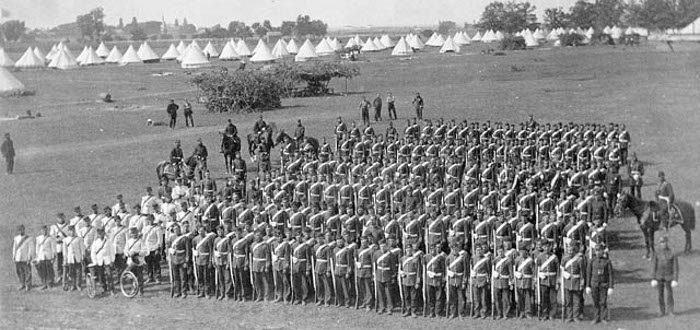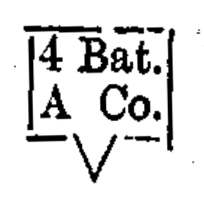Topic: Canadian Militia
 The 13th Battalion, Volunteer Militia Infantry, at the camp, Niagara, in the summer of 1871.
The 13th Battalion, Volunteer Militia Infantry, at the camp, Niagara, in the summer of 1871.
Source: Library and Archives Canada; Online MIKAN no. 3260431.
Headquarters
Ottawa, 6th May, 1881.
General Orders (10).
Annual Drill 1881-82
Orders relating to Duties in Camp.
The Major General Commanding desires the attention of the Staff of Districts and of Officers stationed in camp, this year, to the following points:
(1.) Discipline—means the cheerful obedience of all ranks, for the benefit of all, to all orders. Orders must be few, and well considered before issued, then it will be seen that they are intended to be obeyed.
(2.) Before going into camp Captains of Companies should make sure that each man is in good health, has had his hair out, and has provided himself with a change of shirt, socks, a towel, comb, soap, a boot brush, needles and thread, boot laces—and that his boots fit him easily, have broad soles, and low heels,comfort in walking over rough ground to be considered rather than appearance. A pair of light shoes, for change, will be found very useful in camp. White Cap Covers will be permitted, of uniform pattern by Battalions.
(3.) It is desirable that every Officer should have a small map of the Country within a circle of 10 miles, or more, of the Head Quarters of his Corps.
(4.) Once each day the men must parade in marching order. Knapsacks on in such Corps as have Knapsacks, in others with Great Coats and Straps on, and with Havresacks and Water bottles, (water in them). Particular attention to be paid that these articles are put on correctly so as to be carried in the easiest method:—men to be practised in taking them off and putting them on quickly and properly,—as to which it will be well to encourage a spirit of rivalry between Companies. After this the Knapsacks or Great Coats may be taken off and drill carried on, in lighter order, at the discretion of the Brigadier .
(5.) The Major General desires to impress on all ranks that to "march past" is not the main object; that is only a comparatively unimportant part of a soldier's duties. Care is to be taken that in the endeavour to do this well, time is not expended which should be used on more important instruction such as Guard Mounting, duties on guard, the instruction of sentries in their duties and in the knowledge of their orders, and method of challenging Rounds, &c ., &c . In the same way that Squad and Company drill lead up to Battalion drill, so the manual and firing exercises lead up to that which is of more importance, viz: position and aiming drill,which are essential for good shooting and these therefore must be taught with care and practised daily. In those camps where Ranges are available,rifle practice will be carried out strictly according to Regulations, and care is to be taken that until a man knows his correct position and how to aim he is not to be permitted to fire at a Target. To do this would be to confirm him in any errors he may have acquired and prevent his ever becoming a good shot.
(6.) It is very desirable that no man be employed out of the ranks, (as a Cook, Groom, Servant, &c .,) who has not, during a former year or this year, learned his duties in the ranks. If it should be found unavoidably necessary to so employ untrained men these are, on no account, to be permitted to goto Rifle Practice. It is suggested to officers commanding Battalions and Companies that a permanent Cook per Company not a Militiaman, if procurable, would be very desirable, as insuring good food for the men without taking a man from the ranks. Companies of only Ranks 43 can ill afford to spare a single man away from the Ranks. In the daily Company States every man out of the Ranks must be clearly accounted for. Staff Officers must see to this.
(7.) Deputy Adjutants General of Districts will make sure that each Battalion has its own "Battalion Call" which is to precede all Calls sounded in camp by that Battalion.
The "Assemble" is never to be used for Battalion purposes—and only by the special order of the Senior officer in camp when he wishes the whole force to turn out. Calls not preceded by a Battalion Call apply to the whole force.
The Battalion Call sounded twice, or oftener, in camp, will mean that that particular Battalion is to fall in by Companies and stand fast for further orders.
When on parade bugle calls are to be sounded ONLY by order of the officer commanding that parade—and if he should cause the "Retire" to be sounded, it must be preceded by the Battalion Call of that Battalion to which it is to apply,—but, as a rule, retirements are only to be made by word being passed to the front Commanding Officer's distinct order.
The "Retire" by itself is never to be sounded.
(8.) At Inspections great stress will be laid on the cleanliness of Arms, the correct fitting of accoutrements, and the manner in which Guards and Sentries perform their duties, and as regards the knowledge of their Men as well as of their Company Drill, by Company Officers and Non-commissioned Officers Officers must always be ready in whatever order they may be marching to form line to the front,with a view to attack.
(9.) Cleanliness of all parts of the camp and its neighbourhood must of be all attended to and reported on by Inspecting officers.
The walls of the tents to be rolled up each day, so as to make a free current of air.
(10.) Personal cleanliness of the men must be seen to—and when practicable bathing parades should be established, under the Company officers . In deep or rapid water good swimmers must be told off to prevent accidents.
(11.) Officers commanding camps will find it very instructive, where the nature of the neighbourhood permits to march the Force out a short distance from camp, post piquets, dine, rest, drill and return to camp afterwards, on route practising advance and rear guards and other simple and useful manoeuvres. No man to fall out of the ranks without permission from his Captain, and his rifle and Knapsack to be carried by his comrades until he returns. A halt for few minutes every hour.
(12.) An officer of the Staff will attend every parade which will not be dismissed until he gives the order, verbally or by bugle call. Then, at discretion of Battalion Commanding Of6cers, Captains will march off their Companies to their private parades for dismissal.
(13.) The Manual Exercise, for the future, will be as laid down for short rifles—except in the case of the Governor General's Foot Guards and such corps as may receive special sanction to drill as with long rifles.
(14.) Care must be taken that the Camp Guards are placed where they will be most useful, and that sentries when halted, and when turning on the march, turn outwards (that is towards the enemy). Parole and countersign to be used, and care taken in teaching sentries how to challenge, etc ., and after challenging that he must not give the permission to "Pass" until he has had time to satisfy himself that all is correct .
 (15.) The Staff of Encampments should come provided with:—A measuring tape for correctly laying out the camp, a few boards with spike at bottom to show the battalion, company, etc., etc., a sufficiency of order boards for guards and sentries, shovels and picks for digging latrines, etc., axes, etc., and it is good practice to get the men to make (of branches of trees, etc .) sentry boxes for the sentries, and to erect racks for their arms and accoutrements near the tents.
(15.) The Staff of Encampments should come provided with:—A measuring tape for correctly laying out the camp, a few boards with spike at bottom to show the battalion, company, etc., etc., a sufficiency of order boards for guards and sentries, shovels and picks for digging latrines, etc., axes, etc., and it is good practice to get the men to make (of branches of trees, etc .) sentry boxes for the sentries, and to erect racks for their arms and accoutrements near the tents.
N.B. Camps need not be laid precisely according to diagrams by Regulation but according to varieties of the ground.
By Command,
Walker Powell, Colonel,
Adjutant General of Militia,
Canada.

